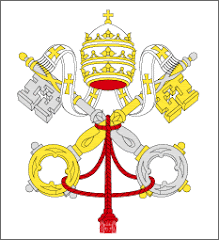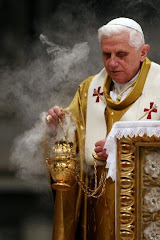
My next few posts will constitute an apologetic for the sacrament of Baptism and what the Catholic Church teaches in regard to it. I will deal with four Protestant objections, objections that were given to me while discussing this with a Protestant friend of mine. I'm fully aware that the answers I provide are far from exhaustive, but I thought it best to keep it simple here.
Protestant Objection #1:
"Baptism is not necessary for salvation, because baptism does not save a person. Faith in Jesus Christ saves, and that is all that’s needed."
Catholic Answer #1:
1 Peter 3:20-21: “…when God’s patience waited in the days of Noah during the building of the ark, in which a few, that is, eight persons, were saved through water. (21) Baptism, which corresponds to this, now saves you.”
If Peter, being an apostle, knew that Baptism did NOT save a person, why would he write such a thing?! If baptism does NOT save a person, then Peter was either mistaken or he was being extremely irresponsible in his writing. An appeal to the context of this verse doesn’t make the classic Protestant belief any more tenable. The context is about salvation and the fact that Christ died for us. In no way would the context change the interpretation of verse 21 that baptism truly does save us.
By saying that baptism saves a person is NOT to say that Baptism alone saves a person. There must necessarily be an interior desire for salvation. Then and only then(at least for the adult believer; Catholic belief about infant baptism will be taken up later) can Baptism save. We can’t force a person into the waters of Baptism and expect that the effects of Baptism would take hold of the person. The person must, in a sense, take hold of the effects of Baptism by his belief and desire for salvation. This has been the constant teaching of the Catholic Church since the beginning. Granted there are those who get focused on the external act to an extreme, the extreme being that they mistakenly come to the belief that merely the act itself brings about salvation, as though God is simply a machine that can be manipulated. Say the magic words and out comes salvation!
Answer #2:
Acts 8:36-39: “And as they went along the road they came to some water, and the eunuch said, ‘See, here is water! What is to prevent my being baptized?’ And he commanded the chariot to stop, and they both went down into the water, Philip and the eunuch, and he baptized him. And when they came up out of the water, the Spirit of the Lord caught up Philip.”
This passage is very telling with regard to the question about the necessity of baptism. After accepting the gospel as preached by Philip the deacon, the eunuch becomes emphatic about being baptized when he sees water. This begs the question: why would the eunuch have felt the need to be baptized if Philip had not already told him about the necessity of it? If baptism was not necessary for salvation, then why would the eunuch make a fuss of it? And why was Philip caught up by the Spirit and taken away from the eunuch immediately after the eunuch’s baptism? It seems as though the Spirit was waiting until after the eunuch was baptized because that marked the point at which the eunuch obtained salvation. He no longer needed Philip, for at the moment he was baptized, salvation was gained. If he was saved when he accepted Jesus due to Philip’s preaching and not due to baptism, then why didn’t the Spirit take Philip at that point? Why did he wait until after the eunuch was baptized? These are all, of course, both speculative and rhetorical questions.



















1 comment:
Very good, Joseph. I love St. Peter's connection of great flood being a type of baptism. It is also quite important to note the sanctifying aspect of baptism, as through the circumcision of the Jews is fulfilled. This union of justification and sanctification is a very important underlying disagreement between the Protestant and the Catholic.
Post a Comment